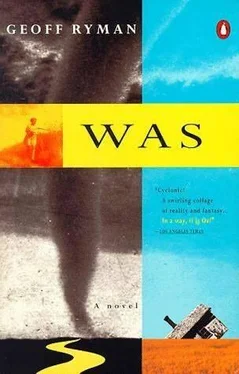"What's wrong with Highway 14?" Ira asked.
"It's not from Back Then," said Jonathan. "This is the old Sierra Highway. See? The old railway tracks run beside it." His voice was hushed with something like lust. The car tires hummed a broken melody on the road surface.
"Woe-hoe!"
Jonathan stopped to photograph an old water tower, perched on wooden beams, with a faded, flaking advertisement painted in a circle on it. They passed a low, stricken arcade of brick shops-"Happy Hocker Pawn Shop." Jonathan photographed that, too.
"Why?" Ira asked.
"It shows no one uses this road anymore."
Jonathan stopped to photograph a railroad sign.
"Doesn't it take you back?" he asked. "I haven't seen a warning sign like that in maybe ten years." The warning sign had a round black plate with a long, sheltering hood over the light. In front of the crossing, there was a wooden X painted black and white. Jonathan photographed that too. When Jonathan started to photograph the telephone poles, Ira felt compelled to ask him why again.
" 'Cause of this little plate on it, see, embossed? Pure thirties." The picture was taken.
"What I mean is why do you do this at all? This whole thing?"
Jonathan smacked his lips as if tasting something. "I'm trying to piece it together."
"But why?" Their feet crunched in companionable unison back along the soft shoulder toward the car.
"Oh," said Jonathan, bundling himself into the car. He looked preoccupied. He put on a pair of mirror shades. Somehow, Ira knew, he gave Jonathan the confidence to dress as he did, despite his age, despite himself. Ira knew Jonathan was shy; Jonathan was quiet.
Ira eased the car back onto the road. Jonathan answered the question.
"I do it so that I can see it. Back Then, I mean. I want to see it, so I can catch some of the flavor. Of the people."
"So you can act them?"
"Maybe sometime. I just get this strange feeling of something gone. It makes me love it. I even fancy the guys in the old sports photographs. It's because they're gone, now, or old."
"I get it," said Ira. "It's necrophilia."
"It's just that, in some of those old photographs, only a few of them, they're so clear, like they were taken yesterday, you could almost just walk into the street, with the wooden houses and the funny windows and the cars with canopies, and the guys with straw boaters. And some of the faces, only some of the faces, you can see who they were, what kind of people. And some of them-some of the old flinty-eyed kind-they might as well be Martians."
"They didn't like being photographed either." Ira hated photographs of himself.
They went first to the public library. They nearly always did on Jonathan's expeditions. The library was on Avenue J.
"Imaginative street names."
"Oh hey, that's nothing, you want confusion, it used to be that all the streets running east to west were numbered. Then they turned them around sometime so the numbered streets run north to south. So you can never tell from a photograph if Tenth Street means Lancaster Boulevard or not."
"So who wants to know?" Ira asked. "Except you?"
AIDS? asked a cheery poster inside the library. YOU'RE NOT ALONE.
"Well, that must be encouraging for them," said Ira.
Jonathan asked at the reference desk for a copy of the 1927 local paper. It had been stolen. Jonathan took 1928 instead. Ira sat and read Jonathan's book.
It was full of photographs. There were Mexican railroad workers in the snow. A great cloud of rabbits, thousands of them, ran between picket fences, watched by women in high, folded formal hats. Someone called Mr. Hannah and his friends posed on the front porch of the Lancaster Hotel in 1901. The hotel had two floors and was three windows wide, and the upper floor of the porch leaned outward. Cowboys lined up on horseback in 1906. There were truckloads of alfalfa, and photographs of floods, horse carriages fording the main street. The Woman's Relief Corps smiled out at Ira from the turn of the century. Some of the women were named, but there was one woman with a particularly smiling, attractive face who was not named. No one, apparently, knew who she had been.
Ira began to be able to trace particular people. One face started as a watchful, rather handsome lad graduating from grammar school in the twenties. Then he was seen even more stern behind the counter of a grocery store. The sports teams began and there he was again, still stern until the 1930s when, disastrously, he smiled. His face looked plump, uncertain, unrecognizable. And there he was as a coach in 1948, looking suddenly lively, bright-eyed, gleaming. In one photograph, in the 1950s, he was portly, polished and beaming. It was the story of a man who had learned how to smile.
Ira looked up at the quiet, modern library, with its rows of books, its tan and varnished index-card files, and its very slightly battered computers. Redolent of its age. There will come a time, Ira thought, when Jo and I are gone. Or one of us is gone. It wouldn't be the same, with one of us gone.
An athletic-looking man in running shoes strode past and left behind him a disturbance in the air, a bit like body odor. Ira looked at Jonathan, his long, fan-shaped back, his nonexistent butt, his wiggly, knobbly legs, and the effect on Ira was bland, neutral as if the body were invisible. A perfect relationship, except for one thing.
Ira went over to see how Jonathan was doing.
As he approached, Jonathan seemed to flicker sideways somehow, and he flipped the microfilm forward.
"You really don't want me to see what this is all about, do you?" Ira chuckled.
"I wanted you to look at this," said Jonathan, oblivious with enthusiasm. A headline in quaint serif type said: STERLING RINEAR TALKS TO KIWANIS ABOUT EISTEDDFOD.
The Eisteddfod was the Welsh bardic festival-another one of Jonathan's enthusiasms.
"It just all connects," said Jonathan.
Like electricity. Even Ira felt the jolt, but only through Jonathan.
"Look at this. And look at this," said Jonathan, showing him ads for Safeways and banks.
"I mean the Bank of Italy. What was it doing here? Except that it became the Bank of America." He paused. "You bored?"
"A bit," admitted Ira.
Jonathan rubbed his forehead and looked helplessly at the unending trail of stories, advertisements. "Yeah. Okay. I just wish I could photograph the whole thing."
It was impossible to catch the past. "You know, someday they'll do a computer model of every town every ten years. The shops, the cars, the parks, the houses. The people in them, the clothes, everything. And you'll put on your electronic glasses, and your earplugs, and you'll walk through it. You'll say hello to women in cloche hats and brown silk stockings and they'll say hello back." He paused, and Ira saw that he was almost near tears. "In very slightly tinny voices."
It was Ira's private conviction that he had married a genius. Ira never said anything about this to anyone, especially to Jonathan. But Ira had seen Jonathan act Shakespeare and had heard him talk. No one else knew what Jonathan was. The TV shows, the horror movies in which Jonathan appeared, were rubbish. This only made it more poignant for Ira, so Ira joked.
"Wouldn't you bump into them if you had electronic specs?"
"This isn't some dumb joke, Ira." Jonathan's face had suddenly gone solemn, and slightly ill-looking.
"No," said Ira gently. "No, it isn't." Ira kept watch over Jonathan. There was a downside to the hyperactivity that glittered in Jonathan's eyes.
Suddenly the downside was dispelled or, rather, cast out. "Get out of here!" said Jonathan, bullish again, and he stood up with a kind of whiplash smartness to his spine. He tossed the microfilm up into the air and caught it effortlessly. He was strangely put together, too long in the back, but top-heavy, with small thin legs. He had wonderful coordination and he always beat Ira at everything. Ira had to try hard at everything. Jonathan tried hard at nothing. Ira was the success.
Читать дальше












